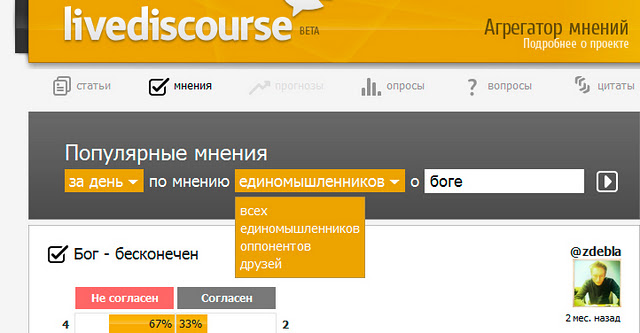I, please, the Internet with a filter
Soon, web services will recommend us not only music for listening, but also a country for living, and a partner for marriage. In this case, which is characteristic, always guess. The mechanism with the furious name “collaborative filtering” is actually a pretty simple idea. It is based on the following assumption: those who agreed in the past will agree with the same in the future. For example, Last.Fm is able to fairly accurately predict which song the user will like, having an incomplete list of his likes and dislikes in music.
Please note: this forecast is completely individual, although information is collected from many participants. This approach is fundamentally different from the more primitive one, which gives for each object of interest “the average temperature in the hospital”, that is, an average estimate of the majority — for example, IMDB does this.
Otherwise, the Russian recommendation service Livediscourse does it . This is a blogging platform with cross-posting on the social network that can comment on any page on the Internet (more about the functionality of a startup, but it is quite wide, you can read it here).

I asked the creator of Livediscourse Vitaly Fedosyuk how his service is going to pick up friends and enemies, like tracks in Lastfm.
- How exactly can a user of Discourse receive system recommendations?
On the main page of LiveDiscourse there is a filter phrase "Most Popular of the Day according to like-minded people." This is collaborative content filtering. There is one “but”: this option appears when you already have like-minded people. And in order for them to appear, you need to vote on 10 opinions or polls.
You can do filtering by opponents: in this case, we have the opposite recommendation for those who like to search for “hollywood” topics.
- After testing the service, the question arises: what is the difference between “friends” and “like-minded people”?
Friends are those whom you added yourself, and like-minded people, like opponents, are automatically selected based on the results of your and other people's votes. A like-minded person is one with whom you agree in 75% of cases, an opponent - with whom you disagree in more than half of cases.
If you go to the LiveDiscourse user’s profile and click on “opinions”, you can see exactly what your views coincide and diverge. In this case, before voting, the system will try to predict your opinion in advance, based on an analysis of the votes of your like-minded people and opponents.

- In the section “Forecasts” there is a “Sum of bets” and “Relative success” - what are these options?
“Forecasts” are made on the basis of the exchange. You can read more about this here: en.wikipedia.org/wiki/Prediction Market
In short, such a market of predictions in a game-like form, interesting to the user, allows a high degree of probability to predict any events using the “collective mind”.
- What are points for? Can they be changed for something?
Not yet, they will be used as the internal currency of the service. Although in the future, the forecast exchange will work with real money.
Please note: this forecast is completely individual, although information is collected from many participants. This approach is fundamentally different from the more primitive one, which gives for each object of interest “the average temperature in the hospital”, that is, an average estimate of the majority — for example, IMDB does this.
Otherwise, the Russian recommendation service Livediscourse does it . This is a blogging platform with cross-posting on the social network that can comment on any page on the Internet (more about the functionality of a startup, but it is quite wide, you can read it here).

I asked the creator of Livediscourse Vitaly Fedosyuk how his service is going to pick up friends and enemies, like tracks in Lastfm.
- How exactly can a user of Discourse receive system recommendations?
On the main page of LiveDiscourse there is a filter phrase "Most Popular of the Day according to like-minded people." This is collaborative content filtering. There is one “but”: this option appears when you already have like-minded people. And in order for them to appear, you need to vote on 10 opinions or polls.
You can do filtering by opponents: in this case, we have the opposite recommendation for those who like to search for “hollywood” topics.
- After testing the service, the question arises: what is the difference between “friends” and “like-minded people”?
Friends are those whom you added yourself, and like-minded people, like opponents, are automatically selected based on the results of your and other people's votes. A like-minded person is one with whom you agree in 75% of cases, an opponent - with whom you disagree in more than half of cases.
If you go to the LiveDiscourse user’s profile and click on “opinions”, you can see exactly what your views coincide and diverge. In this case, before voting, the system will try to predict your opinion in advance, based on an analysis of the votes of your like-minded people and opponents.

- In the section “Forecasts” there is a “Sum of bets” and “Relative success” - what are these options?
“Forecasts” are made on the basis of the exchange. You can read more about this here: en.wikipedia.org/wiki/Prediction Market
In short, such a market of predictions in a game-like form, interesting to the user, allows a high degree of probability to predict any events using the “collective mind”.
- What are points for? Can they be changed for something?
Not yet, they will be used as the internal currency of the service. Although in the future, the forecast exchange will work with real money.
